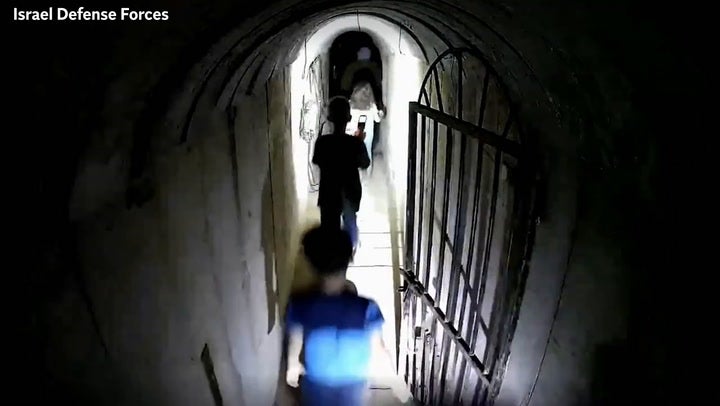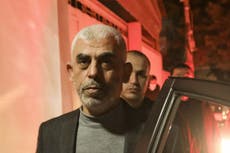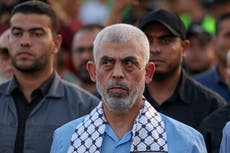Can the killing of Hamas leader Yahya Sinwar bring an end to Israel’s war in Gaza?
This is the type of momentous event that could bring an end to the conflict, but Israeli PM Benjamin Netanyahu has already vowed to push on, Chris Stevenson writes


For years before he rose to become overall leader of Hamas this summer, Yahya Sinwar had consolidated his power, giving him outsized reach compared to other commanders.
He had been on the Israeli radar for decades, with intelligence reports describing him at various points as cruel and violent but with powers of endurance. He was known as the “Butcher of Khan Younis” for his brutal approach to Palestinians suspected of collaborating with Israel.
Sinwar convinced Hamas founder, Sheikh Ahmed Yassin, that it needed to be purged of informants for Israel. They founded a security arm, then known as Majd, which Sinwar led. Arrested by Israel in the late 1980s, he admitted under interrogation to having killed 12 suspected collaborators. He was eventually sentenced to four life terms for offences that included the abduction and killing of two Israeli soldiers. During his time in prison, he learned Hebrew and built up a picture of Israeli society.
In 2008, Sinwar survived an aggressive form of brain cancer after treatment at a Tel Aviv hospital. Israeli prime minister Benjamin Netanyahu released him in 2011 along with about 1,000 other prisoners in exchange for Gilad Schalit, an Israeli soldier captured by Hamas in a cross-border raid years previously. Netanyahu was harshly criticised for releasing dozens of prisoners held for involvement in deadly attacks.
Hence no expense being spared to hunt him down in the wake of the 7 October attack, which Sinwar is thought to have masterminded, given the iron grip he had on Hamas in his native Gaza. Around 1,200 Israelis were killed and another 251 taken hostage, with Israel saying that Sinwar was hiding among the captives to ensure Israel could not kill him.
For Netanyahu, the vitriolic way he talks about Sinwar appears personal, which makes sense. The Israeli leader saw Sinwar rise up to become Israel’s most wanted man. Always defiant, Sinwar ended one of his few public speeches by inviting Israel to assassinate him, proclaiming in Gaza, “I will walk back home after this meeting.” He then did so, shaking hands and taking selfies with people in the streets.
The apparent last footage of Sinwar, in the tunnels under Gaza, released by the Israeli military in February but dated to the days following 7 October was one of many occasions where the Israelis suggested they were closing in on his hiding place. But now he has been killed in a seemingly chance encounter with Israeli soldiers in southern Gaza. Israel’s most difficult target has finally been eliminated, in Israeli military parlance.

So what now? Hostage families and Israeli opposition politicians have called for a ceasefire and hostage release deal now, with 101 captives still in Gaza, although more than 30 are believed to be dead. For Netanyahu, a chance for a boost in popularity, having faced mounting criticism both domestically and internationally over the mounting death toll in Gaza, 42,000 and counting according to health officials in the Hamas-run territory. Netanyahu has already said that Israel’s war is not over, not least given the ground invasion against Hezbollah in Lebanon. Both backed by Iran, the Israeli prime minister knows he is also in a battle with Tehran and will want to make the most of the upper hand he will currently feel he has.
One of the things keeping a ceasefire from being agreed was both the hardline Sinwar and the under-pressure Netanyahu both refusing to compromise. Officials in the US and the wider West will hope this is the moment that will bring sides to the table. Netanyahu will be on a high, while Sinwar’s possible successors and the wider Hamas command structure will know that nobody will have the same standing as Sinwar to dictate matters.
Sinwar’s death is the heaviest blow Hamas has suffered in more than a year of war, with more serious consequences for its remaining forces in Gaza than the assassination of former political leader Ismail Haniyeh, who had less connection with the day-to-day running of the conflict. A conflict US officials believe Sinwar wanted to continue, to shred Israel’s international reputation and to damage its relationship with its primary ally Washington.
Netanyahu’s critics have also accused him of wanting to keep the war going so that he can stay in office, rather than face probable elections when it is over. One of the key aims he has consistently touted is the need to destroy Hamas's leadership; the White House may argue that with the death of Sinwar, that has been achieved.
Sinwar’s killing is the type of momentous event that could help quicken the end of the war in Gaza, although the uncertainty it leaves could still mean a long road ahead. All of those involved in the conflict will want to work out where they stand quickly – although Netanyahu will try and press forward in both Gaza and Lebanon as much as he can. Only time will tell where that ends up.
Join our commenting forum
Join thought-provoking conversations, follow other Independent readers and see their replies
Comments


Bookmark popover
Removed from bookmarks